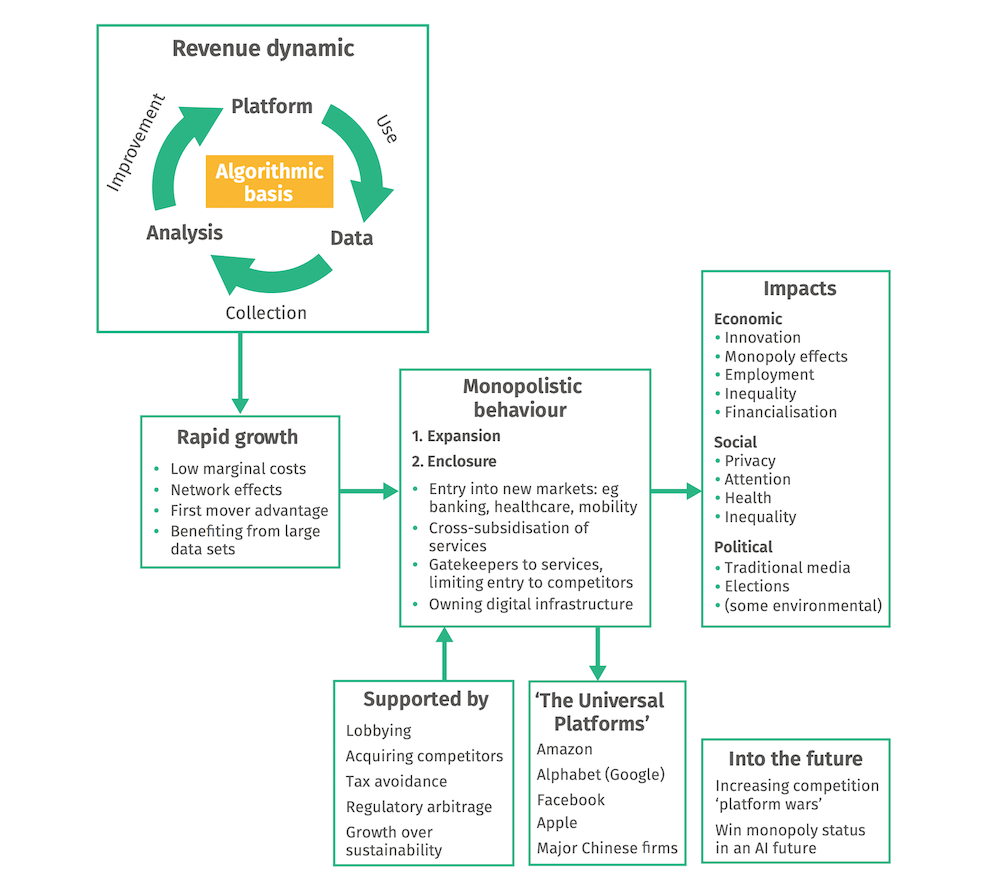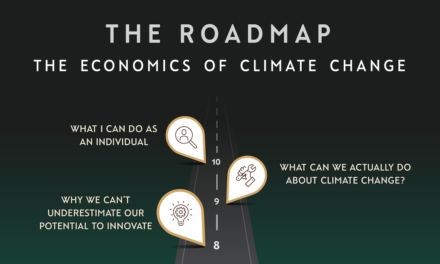A Digital Commonwealth?
BY MATHEW LAWRENCE & LAURIE LAYBOURN-LANGTON

Mathew Lawrence and Laurie Laybourn-Langton, of IPPR, propose policy measures to temper the market-driven excesses of our ‘Universal Platforms’. We’re talking Facebook etc. They call for a ‘Digital Commonwealth’ so that digital tech can start working for the benefit of all of society. UK focussed; globally relevant.
The below is a summary version of their full report, which can be downloaded here.
Digital technology is delivering a huge range of benefits to businesses, citizens and wider society. Platforms – online applications that intermediate between the provider of a service and its users – have unlocked many of these benefits by sorting and connecting an enormous range of services and products, both online and off.
At the forefront of the platform economy are Facebook, Alphabet, Amazon and Apple – they’ve accumulated the most data, developed the most advanced analytical capabilities and gained greatest ownership of the foundational infrastructure, from mapping to cloud computing, that underpins all digital technology. We refer to them as the ‘universal platforms’ and their ambitions are the focus.
Increasingly, the operations of the universal platforms are driving negative social and economic outcomes. Critically, these outcomes are not aberrations but a result of the universal platform business model: the extraction and analysis of data for profit. Data is the source of their economic and, increasingly, social power.
“Data is the source of their economic and, increasingly, social power. Maximizing the potential of digital technology requires managing data and digital infrastructure as a collective good.”
This conclusion is based on four propositions:
1. Platforms are diverse in form but share common features. The major platforms dominate the digital economy.
- Platforms are multi-sided online arrangements between suppliers and users, with the platform acting as an intermediator. Types of platform include those that use data insights to promote products and those that provide the digital infrastructure, including cloud computing, on which other platforms operate.
- Platforms all benefit from a number of factors inherent in digital markets, including low marginal costs, powerful network effects, and an emphasis on growth in users and other measures over profitability.
- These effects tend dominant platforms towards monopoly. In the UK: Facebook has 74% of the social network market share; Amazon is responsible for 90% of all e-book sales and an estimated 80% of online physical book sales, and Google has an estimated 88% share of the desktop search engine market and 95% of searches on mobile.
- The ‘universal platforms’ have the most data and ownership of digital infrastructure. Facebook, Alphabet, Amazon and Apple have accumulated the most data, developed the most advanced analysis capabilities, and gained greatest ownership of the foundational infrastructure, from mapping to cloud computing, that underpins all digital technology.
- This means the universal platforms are poised to dominate artificial intelligence markets. Dominance in the fields of data extraction and analysis means that the leading platforms are likely to develop the most advanced artificial intelligence (AI) technologies, positioning them to dominate the application and development of new, potentially transformative, products and services.

The Universal Platforms’ Revenue Dynamic (Source: IPPR)
2. Data extraction and analysis are central to the platform business model. Platforms share common features because they have the same core revenue model: the extraction and analysis of data for profit.
- Data is generated by users of the platform, aggregated and analysed to create insights that are sold for profit. They are also used to improve the platform, expanding artificial intelligence capabilities that underpin the development of the platform’s insights. This process is immensely valuable, with Alphabet generating revenues of $32.3 billion in the fourth quarter of 2017, up from 24% the year before, with 85% of that revenue generated from its advertising business. The combined annual revenue for the world’s five largest companies by market value – all of them platforms in some form – already exceeds the GDP of 90% of the world’s countries.
- Profiting from the extraction and analysis of data generates a circular, expansive dynamic: the more data that is captured, the greater the potential for revenue. As such, the impulse to capture, analyse and monetise data sits at the heart of the platform business model, dominating their strategies and dictating how they develop and deploy digital technology.
3. The universal platforms have boundless ambition. With revenue predicated on the extraction and analysis of data, platforms seek to expand into new markets and to enclose users into their ecosystem of services, maximising data throughput.
- Platforms provide many positive benefits. For consumers, useful services are provided at low to no immediate economic cost, with greater convenience through coordination, and with more personalisation. For businesses, market access is expanded, transaction costs can be reduced, and service is provided. At a societal level, access to information, social connections and material efficiency is improving.
- But this business model drives platforms to behaviours that are creating serious economic, social and political problems. By acquiring innovative startups and limiting access to their large datasets, platforms could be limiting the innovation potential of the economy; platforms are increasing economic rents and contributing to a declining share of national income going to labour; dominance in advertising markets has eroded existing means of developing and accessing news content; and social network platforms have potentially been used to unduly manipulate democratic proceedings.
- These outcomes are not aberrations or temporary phenomena, but are rooted in the purpose and revenue model of most major platforms. Furthermore, the greatest benefits and threats come from the universal platforms, as they are expanding vertically and horizontally, and have large and growing AI capabilities.
- We stand at a crossroads. So far, the development of the modern digital economy has largely been determined by powerful market actors, with little proactive response from government. Without action, the boundless ambition of the universal platforms threatens to undermine democracy, accelerate inequality and concentrate economic power.
- Whether digital technology works for or against the collective good will be decided by politics – or the lack of it.
4. Data and the digital infrastructure should be organised as a collective good.
Public policy should seek to shape the production and distribution of data and its use for the common good, moving from conditions of monopolistic data enclosure to a thriving, creative and pluralistic ‘digital commonwealth’, where the vast potential of socially generated data helps develop the wealth, creativity and capacity of all society. This should cover data generated by the interaction of users with platforms as well as the data on individuals collected and stored by the state. In pursuit of these goals, we recognise the limits of the UK’s domestic levers given the international nature of the digital economy and challenges of jurisdictional power. Nonetheless, we do not believe we are powerless, and indeed think more can be done with bolder policymaking.
We propose four measures:
- Strengthen competition law to foster innovation by reforming the Competition & Markets Authority and a new requirement for major platforms to open up their data upon entry to new markets in which they have a major advantage as a result of their existing data.
- Regulate platform giants as public utilities through a new Office for Digital Platforms, including the opening-up of data in cases and markets that are deemed to be in the public interest.
- Create a Digital Britain public service that drives the curation and productive use of public data (establishing a Digital Citizen Account and public data stores through which useful insights from aggregated, anonymised data could be broadly shared) and oversees the creation of a national data portal, which would provide a single site linking to opened-up private and public sector data.
- Introduce Local Digital Commonwealth Strategies to drive the development and adoption of local platform services, from community decision-making apps to innovative businesses, leveraging public sector data sources and personal data from the opening-up of private sector data. Local authorities should develop place-based Digital Commonwealth Strategies that reimagine how data is generated and used, and ensure value is retained and circulated among communities where data is generated to provide economic, social and environmental value.
Digital technology could deliver enormous socioeconomic benefits across Britain (and the world), but at the moment the development and adoption of these and future technologies have been almost entirely market-led, with little to no strategic policy response from governments around the world, and are dominated by a small number of powerful firms which monopolise our data.
Data should become more of a collective resource so we can move from the enclosure of data to a model of digital commonwealth; only then can we realise the potential of the digital technology to enrich the lives of all.
___
The full IPPR policy discussion paper can be download here. ‘The Digital Commonwealth: From private enclosure to collective benefit’ was researched and written by Mathew Lawrence and Laurie Laybourn-Langton.








